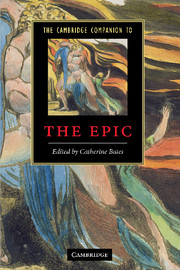Book contents
- Frontmatter
- 1 The Epic of Gilgamesh
- 2 Greek epic
- 3 Roman epic
- 4 Heroic epic poetry in the Middle Ages
- 5 Dante and the epic of transcendence
- 6 Italian Renaissance epic
- 7 Camões’s Os Lusíadas: the first modern epic
- 8 The Faerie Queene: Britain’s national monument
- 9 The seventeenth-century Protestant English epic
- 10 Mock-heroic and English poetry
- 11 Romantic re-appropriations of the epic
- 12 Ezra Pound, T.S. Eliot, and the modern epic
- 13 Derek Walcott’s Omeros
- 14 Epic in translation
- Guide to further reading
- Index
7 - Camões’s Os Lusíadas: the first modern epic
Published online by Cambridge University Press: 28 May 2010
- Frontmatter
- 1 The Epic of Gilgamesh
- 2 Greek epic
- 3 Roman epic
- 4 Heroic epic poetry in the Middle Ages
- 5 Dante and the epic of transcendence
- 6 Italian Renaissance epic
- 7 Camões’s Os Lusíadas: the first modern epic
- 8 The Faerie Queene: Britain’s national monument
- 9 The seventeenth-century Protestant English epic
- 10 Mock-heroic and English poetry
- 11 Romantic re-appropriations of the epic
- 12 Ezra Pound, T.S. Eliot, and the modern epic
- 13 Derek Walcott’s Omeros
- 14 Epic in translation
- Guide to further reading
- Index
Summary
Of the great Western poets, Luis Vaz de Camões (c. 1524-80) remains the least known outside his native land, and, of the premier Western epics, his Os Lusíadas (1572) has the unenviable distinction of continuing to be poetry's best-kept secret. Yet a century and a half after the Portuguese poet's death Voltaire named him the 'Portuguese Virgil', and the nineteenth century, valuing the history and biography embodied in the poem, called him the 'Portuguese Plutarch'. Camões has always had the respect of poets and critics. His poetic eminence was noted by poets such as Torquato Tasso, Góngora, and Goethe, and the dramatist Lope de Vega. In the twentieth century Erich Auerbach called the Lusíadas 'the most beautiful epic of the Iberian Peninsula'. It is 'the great epic of the ocean', he adds, 'which sings of Vasco da Gama's voyage around Africa and the Portuguese colonization of the Indies'. The Lusíadas is universally taken as Portugal's national epic, celebrating the voyages of discovery that, in the fifteenth and sixteenth centuries, made that country a great maritime and imperial power. The 'Lusíadas' of the title are the sons or people of Lusus (the legendary founder of the province the Romans had named Lusitania), that is to say, the Portuguese.
- Type
- Chapter
- Information
- The Cambridge Companion to the Epic , pp. 119 - 132Publisher: Cambridge University PressPrint publication year: 2010
- 1
- Cited by

